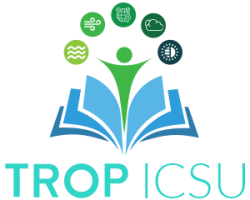Linear Regression on Arctic Ice Data

Linear Regression on Arctic Ice Data Classroom/Laboratory Activity A classroom/laboratory activity to perform linear regression on climate data from the Arctic. Students will perform linear regression analysis on the average monthly extent of Arctic sea ice (from 1979 to the present) and will compare the residual plots for different months. Use this tool to help […]
Modelling Temperature Data by using Trigonometric Functions

Modelling Temperature Data by using Trigonometric Functions Classroom/Laboratory Activity A classroom/laboratory activity to model temperature data by using trigonometric functions. Students will model given temperature data (for Wellington, New Zealand) by using sine and cosine functions. They will compare models and discuss their observations. This activity can be replicated for any location for which temperature […]
Regression Analysis of Global Temperature Data

Regression Analysis of Global Temperature Data Classroom/Laboratory Activity A classroom/laboratory activity to learn about regression analysis of data by using global temperature data over a period of 150 years. Students will plot global mean temperatures, perform regression analysis, and determine global mean temperature anomalies. Use this tool to help your students find answers to: Perform […]
T-tests and Climate Data

T-tests and Climate Data Teaching Module A teaching module by Wendy Van Norden, University of Wisconsin, that makes the use of T-tests to analyse dataset to study seasonal ice cover over Lake Mendota, US, to understand how climate change has impacted ice cover over 160 years. This teaching module will have the following outcomes: Students […]
Linear Regression using Global Temperatures

Linear Regression using Global Temperatures Classroom/Laboratory Activity A classroom/lab activity for Statistics teachers to teach about Linear Regression. This activity is based on a dataset on average global temperature anomalies from 1850 to 2019. Students will learn about introductory linear regression techniques and will learn to make scatter plots of the data provided. This tool […]
Modeling Earth’s Carbon

Modeling Earth’s Carbon Model/Simulation A Model/Simulation to learn about the carbon cycle and carbon dioxide projections based on the observed CO2 concentrations from Land, Ocean and Atmospheric reservoirs. The model includes four RCP scenarios based of fossil fuel emissions: activities on the following topics Business as usual Slower Growth Big Reductions Very Aggressive Students can […]
Modelling the Earth’s Zonal Energy Balance

Modelling the Earth’s Zonal Energy Balance Classroom/Laboratory Activity A laboratory activity to create an energy balance model for planet Earth and obtain numerical solutions for the differential equations in the model. Students will write code (using MATLAB or Mathematica) to model the distribution of the Earth’s surface temperature in response to increasing carbon emissions in […]
Daisyworld – A Model to Explore the Gaia Hypothesis

Daisyworld – A Model to Explore the Gaia Hypothesis Model/Simulation A Model/Simulation to explore the Gaia hypothesis and the concepts of albedo and hysteresis through the example of daisies (living organisms) and their interaction with temperature (climatic factor). Students will configure the distribution of black daisies and white daisies, the albedo for each of these […]
World Petroleum Consumption

World Petroleum Consumption Classroom/Laboratory Activity A classroom/ laboratory activity titled, ‘World Petroleum Consumption’ from Sustainability Math by Thomas J. Pfaff, Ithaca College, USA, to teach integration using a hands-on computer-based classroom activity that includes world petroleum consumption data from 1980 to 2016. This data is provided in an Excel spreadsheet. The classroom activity also includes […]
Differentiation and Wind Energy

Differentiation and Wind Energy Classroom/Laboratory Activity A classroom/ laboratory activity titled, ‘Wind Energy by Selected Countries and World’ from Sustainability Math by Thomas J. Pfaff, Ithaca College, USA, to teach polynomial and logistic differentiation using a hands-on computer-based classroom activity that includes wind energy production data of several countries from 1980 to 2016. This data […]


